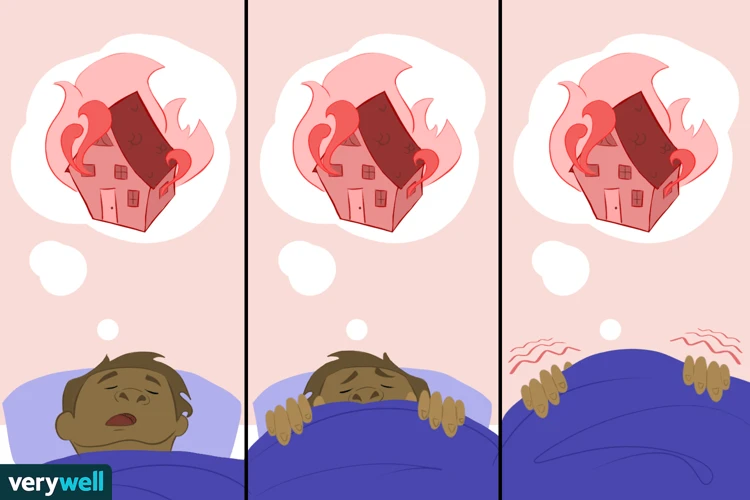Nightmares are a common experience that most of us have had at some point in our lives. However, the occurrence of recurring nightmares can be distressing and confusing. Why do we keep having the same terrifying dream? What is the psychological significance behind these recurring nightmares? In this article, we delve into the topic of recurring nightmares and explore their impact on mental health. We also examine the possible causes of recurring nightmares and their symbolic meanings. Whether you’re looking to understand your own nightmares or someone else’s, this article aims to provide valuable insights into a phenomenon that is often shrouded in mystery.
Contents
- What Are Recurring Nightmares?
- The Psychological Significance of Recurring Nightmares
- Understanding Common Themes in Recurring Nightmares
- The Consequences of Ignoring Recurring Nightmares
- Overcoming Recurring Nightmares
- Conclusion
-
Frequently Asked Questions
- Why do we have nightmares?
- What is the difference between a nightmare and a bad dream?
- How common are recurring nightmares?
- Can recurring nightmares be a sign of a mental health condition?
- Can medication help with recurring nightmares?
- What are some common themes in recurring nightmares?
- Can recurring nightmares be caused by something that happened in childhood?
- What are some self-help techniques for overcoming recurring nightmares?
- When should someone seek professional help for recurring nightmares?
- Can recurring nightmares ever completely go away?
- References
What Are Recurring Nightmares?

Have you ever experienced a dream that seems to haunt you night after night? Do you wake up in a cold sweat, wondering why the same terrifying or unsettling dream keeps recurring? If so, you may be suffering from recurring nightmares. These distressing dreams differ from regular nightmares in that they happen repeatedly, often over a long period of time. Recurring nightmares can be unsettling and disruptive, causing sleep disturbances and distress during waking hours. Let’s take a closer look at what exactly recurring nightmares are and the impact they can have on your mental and emotional health.
Defining Recurring Nightmares
Recurring nightmares are a type of recurring dream that can have a profound impact on an individual’s mental health and quality of life. According to researchers, recurring nightmares are defined as a series of similar dreams that an individual experiences multiple times throughout their lifetime. These nightmares often involve frightening or distressing themes, such as being chased, falling, or being unable to escape danger. Recurring nightmares often have a level of intensity that is not present in other types of dreams, causing individuals to wake up feeling anxious, scared, or stressed.
It is important to note that while many individuals may experience occasional nightmares, recurring nightmares are characterized by their frequency and similarity in content. In fact, studies have shown that recurring nightmares can occur as frequently as once a week, and sometimes even more. Additionally, the content of these nightmares may stay consistent over time, or may evolve to reflect changes in an individual’s life or emotional state.
One of the key features of recurring nightmares is their ability to disrupt an individual’s sleep patterns and overall quality of sleep. This can lead to symptoms such as fatigue, irritability, and difficulty concentrating during waking hours. In some cases, the impact of recurring nightmares may even extend beyond the realm of sleep, causing individuals to experience anxiety, depression, and other symptoms of mental health disorders.
The experience of recurring nightmares can be a challenging and distressing one, and can have significant implications for an individual’s emotional and psychological well-being. Understanding the nature of these nightmares is an important step in identifying potential underlying causes and developing strategies for addressing them.
The Impact of Recurring Nightmares on Mental Health
Recurring nightmares can have a significant impact on mental health. People who experience these nightmares may find it harder to get a good night’s sleep and may feel constantly tired and fatigued during the day. They may become irritable and moody, and their relationships with others can suffer. These individuals may also experience a sense of dread or foreboding that can be difficult to shake off, even during waking hours.
Recurring nightmares can exacerbate existing mental health conditions. People with anxiety disorders, depression, post-traumatic stress disorder (PTSD), and other mental health issues may find that their symptoms worsen when they experience recurring nightmares. This can lead to a vicious cycle, with nightmares making mental health issues worse, and mental health issues making nightmares worse.
It is also worth noting that unresolved and unaddressed recurring nightmares can lead to further complications. For example, people may try to avoid going to sleep altogether or may experience sleep disturbances, such as insomnia. Not only can this exacerbate the impact of the nightmares on an individual’s mental health and quality of life, but it can also lead to physical health problems. Sleep deprivation, in particular, can have serious consequences, including impaired cognitive function, increased risk of accidents, and a weakened immune system.
The impact of recurring nightmares on mental health and well-being cannot be overstated. It is important to acknowledge the impact of these nightmares and take steps to address them before they have a lasting and potentially life-changing impact.
The Psychological Significance of Recurring Nightmares

As we delve deeper into the world of recurring nightmares, it’s important to understand the underlying psychological significance behind these unsettling experiences. Recurring nightmares aren’t just random or meaningless but are deeply rooted in our subconscious thoughts and emotions. By exploring the role of stress, trauma, anxiety, and unconscious thoughts, we can gain a better understanding of why we experience these recurring nightmares and what they might be trying to tell us. So let’s take a closer look and unravel the mysteries of the psychological significance of recurring nightmares.
The Role of Stress and Trauma in Recurring Nightmares
The Role of Stress and Trauma in Recurring Nightmares
Recurring nightmares can often be linked to stress and trauma. Interestingly, it is not uncommon for individuals to experience recurring nightmares years after a traumatic event has occurred. The fear and anxiety associated with trauma can linger in the subconscious mind and manifest itself through nightmares.
Below are some ways in which stress and trauma can lead to recurring nightmares:
- Hyperarousal: Trauma can cause hyperarousal, or a heightened state of anxiety and vigilance. This can lead to difficulties falling asleep or staying asleep, which can then result in nightmares.
- Intrusive thoughts: Traumatic events can leave intrusive thoughts in the mind, causing them to appear in nightmares. These thoughts can be categorized as flashbacks or vivid memories.
- Re-experiencing: Traumatic events can be relived in recurring nightmares and continue to cause distress, anxiety, and fear.
- Avoidance: Coping mechanisms such as avoidance, which is the act of avoiding thoughts or activities related to the traumatic event, can cause nightmares to persist.
It’s important to note that not all individuals who experience stress, anxiety, or trauma will have nightmares. However, for those who do, the nightmares can be quite distressing and interfere with daily life. It’s essential to understand the underlying causes of the nightmares to effectively address and treat them.
The Relationship between Recurring Nightmares and Anxiety
One of the key psychological meanings behind recurring nightmares is their relationship with anxiety. Strongly associated with anxiety disorders, recurring nightmares are often a symptom of unmanaged and prolonged stress or trauma.
Anxiety itself is a complex emotion that can manifest in various ways, ranging from mild uneasiness to severe panic attacks. It’s characterized by intense feelings of worry, fear, or nervousness that can be triggered both by real and imagined events.
In the case of recurring nightmares, anxiety plays a central role in their frequent recurrence. Studies show that people who experience recurring nightmares tend to have higher levels of anxiety than those who don’t.
But what is the link between anxiety and recurring nightmares? It seems that anxiety can both trigger and be triggered by recurring nightmares. On the one hand, anxiety can be a primary cause of recurring nightmares, as people who experience high levels of anxiety are more likely to have irrational fears and worries that can manifest in their dreams. On the other hand, recurring nightmares can also reinforce anxiety by triggering a vicious cycle of fear, dread, and sleeplessness that can worsen overall mental health.
It’s important to note that anxiety disorders are highly treatable, and seeking help from a qualified mental health professional can make a significant difference in managing anxiety and reducing the frequency and intensity of recurring nightmares. Some common therapies used to treat anxiety include cognitive-behavioral therapy (CBT), exposure therapy, and relaxation techniques such as meditation and mindfulness.
The table below summarizes the relationship between anxiety and recurring nightmares:
| Relationship between Anxiety and Recurring Nightmares | Examples |
|---|---|
| Anxiety as a cause of recurring nightmares | Anxious thoughts and worries that can manifest in dreams |
| Recurring nightmares reinforce anxiety | Trigger a vicious cycle of fear, dread, and sleeplessness that worsens anxiety |
| Recurring nightmares as a symptom of anxiety disorders | Panic attacks, phobias, obsessive-compulsive disorder (OCD) |
| Treatment for anxiety and recurring nightmares | Cognitive-behavioral therapy (CBT), exposure therapy, relaxation techniques |
The relationship between anxiety and recurring nightmares is a complex and multifaceted one. By understanding the psychological significance of recurring nightmares and seeking professional help when needed, individuals can work towards reducing anxiety and breaking the cycle of recurring nightmares.
Exploring the Influence of Unconscious Thoughts and Emotions
As we’ve previously discussed, recurring nightmares can often be a manifestation of the mind’s attempts to process and cope with external stressors and underlying emotional turmoil. Much of this processing takes place on an unconscious level, as the brain sorts through and attempts to reconcile various thoughts and emotions related to past experiences and present concerns.
These unconscious thoughts and emotions can exert a powerful influence on the themes and content of recurring nightmares. For example, if an individual is dealing with a repressed trauma or unresolved conflict, their unconscious mind may use recurring nightmares as a means of bringing these issues to the surface for processing and resolution.
Additionally, unconscious fears and anxieties can aggregate over time and come to the surface in the form of recurring nightmares. Such fears may be related to aspects of one’s personality or behavior that they have difficulty accepting, such as feelings of insecurity or fear of failure.
It is worth noting that the interpretation of recurring nightmares will vary from person to person and depend on individual circumstances. Understanding the influence of unconscious thoughts and emotions can, however, be a useful tool for identifying potential underlying causes and themes in one’s recurring nightmares.
| Unconscious Thoughts and Emotions | Influence on Recurring Nightmares |
|---|---|
| Repressed Trauma or Conflict | May use recurring nightmares as a means of bringing these issues to the surface for processing and resolution. |
| Unconscious Fears and Anxieties | May aggregate over time and come to the surface in the form of recurring nightmares related to one’s personality or behavior that they have difficulty accepting. |
| Interpretation of Recurring Nightmares | Varies from person to person and depends on individual circumstances. Understanding the influence of unconscious thoughts and emotions can be a useful tool for identifying potential underlying causes and themes. |
Understanding Common Themes in Recurring Nightmares

As we delve deeper into exploring the psychological meaning behind recurring nightmares, it becomes important to understand the common themes that often appear in these distressing dreams. Recurring nightmares tend to feature similar scenarios, characters, or themes, which can hold significant symbolic meaning. By decoding these symbols, we can gain insight into our underlying thoughts and emotions that may be affecting our mental health. Let’s take a closer look at the symbolic meaning of common recurring nightmares and what they could reveal about our inner psyche.
The Symbolic Meaning of Common Recurring Nightmares
One possible way to write about the symbolic meaning of common recurring nightmares is:
Nightmares can be filled with symbolic meaning, revealing unconscious thoughts and emotions that are trying to surface. Recurring nightmares, in particular, often contain similar themes or symbols that can provide insight into the dreamer’s inner world. Here are some examples of common recurring nightmares and their possible symbolic meanings:
| Nightmare | Possible Symbolic Meaning |
|---|---|
| Falling from a high place | Feeling out of control or unsupported in real life; fear of failure |
| Being chased by someone or something | Avoiding a problem or responsibility; feeling threatened or pursued |
| Being unable to move or speak | Feeling helpless or paralyzed in waking life; suppressing thoughts or feelings |
| Being naked in public or in a public place | Feeling exposed or vulnerable; fearing judgment or rejection |
| Drowning or being suffocated | Feeling overwhelmed by emotions or responsibilities; fear of losing control |
| Seeing someone die or being responsible for someone’s death | Processing grief or loss; feeling guilty or responsible for others |
It’s important to note that these interpretations are not definitive or applicable to everyone. The meaning of a dream depends on the individual’s personal associations and experiences. It’s useful to explore the feelings and associations that come up in connection with the recurring nightmare, rather than relying on a generic interpretation. Working with a therapist or dream analyst can provide additional guidance and support in understanding the symbolic meaning of recurring nightmares.
The Consequences of Ignoring Recurring Nightmares

As unsettling and distressing as recurring nightmares can be, some people choose to ignore them or hope they will simply disappear. However, disregarding recurring nightmares can have serious consequences for both mental health and overall well-being. In this section, we will examine the negative effects that ignoring recurring nightmares can have on a person’s daily life and mental state. It is crucial to acknowledge and address these persistent dreams in order to seek the necessary help and support to overcome them.
How Recurring Nightmares Affect Daily Life
Recurring nightmares can have a significant impact on an individual’s daily life, affecting their mood, energy levels, and overall well-being. Let’s take a closer look at how these nightmares can affect different aspects of daily life:
| Aspect of Daily Life | Impact of Recurring Nightmares |
|---|---|
| Sleep Quality: | Recurring nightmares can disrupt sleep and lead to insomnia, leaving individuals feeling tired, irritable and less productive during the day. Poor sleep quality can also affect their physical health and ability to cope with daily stressors. |
| Mental Health: | Recurring nightmares can contribute to the development of mental health problems such as depression, anxiety, and trauma-related disorders. The psychological distress caused by these nightmares may also lead to a decrease in self-esteem and feelings of helplessness. |
| Productivity: | The impact of recurring nightmares can extend beyond sleep and mental health, leading to a decrease in productivity during the day. Individuals who are constantly tired and stressed may find it difficult to focus on work or school tasks and complete them efficiently. |
| Interpersonal Relationships: | The emotional toll of recurring nightmares can also affect our relationships with others. Constantly feeling irritable, anxious, or depressed can make it difficult to maintain healthy relationships with family, friends, and romantic partners. |
It’s important to recognize how recurring nightmares can affect our daily lives and take steps to overcome them. Seeking professional help or trying self-help techniques may be effective in breaking the cycle of these nightmares and improving overall mental health and well-being.
The Negative Impact on Mental Health and Well-being
The weaved in recurring nightmares can have a detrimental outcome on a person’s overall mental and emotional well-being. The frequency and intensity of such nightmares can lead to chronic insomnia, excessive fear and anxiety as well as panic attacks. Studies show that individuals who experience recurring nightmares have a higher chance of developing depressive symptoms, which can progress into clinical depression if left unchecked.
The occurrence of recurring nightmares can interfere with daily tasks and functional relationships and can hinder one’s ability to concentrate on complex tasks or make acurate decisions. It can also lead to a sense of exhaustion, irritability, apathy, and a perceived lack of control over one’s thoughts and emotions.
Repeated exposure to disturbing dream imagery can also increase distress in daily life, with undefined and unaddressed boundaries between the conscious and subconscious mind, leaving the person struggling to differentiate between reality and dream. Prolonged exposure to these types of nightmares can lead to a risk of psychosis and suicidal tendencies.
It is critical to take steps to mitigate the effects of recurring nightmares on mental health and well-being. Seeking professional help may be the most effective way to address the root cause of these nightmares and develop a treatment plan to alleviate their symptoms.
Overcoming Recurring Nightmares
For those who suffer from recurring nightmares, the experience can be both frightening and exhausting. Fortunately, there are ways to break the cycle and overcome these unsettling dreams. While it may take some effort and persistence, the benefits to mental health and overall well-being can be substantial. In this section, we will explore some self-help techniques and strategies for finding professional support. Let’s take a closer look and see what steps you can take to start sleeping soundly again.
Self-Help Techniques to Break the Cycle of Recurring Nightmares
One effective way to break the cycle of recurring nightmares is to take steps to address the underlying stress or trauma causing them. Here are some self-help techniques to try:
- Journaling: Writing down your thoughts and feelings can help you identify patterns and triggers for your nightmares. It may also help you process and release underlying emotions.
- Relaxation techniques: Practicing relaxation techniques such as deep breathing, meditation, or yoga can help reduce anxiety and promote better sleep.
- Establishing a bedtime routine: Creating a calming bedtime routine can signal to your body that it is time to sleep and help reduce anxiety before bed. This can include reading a book, taking a warm bath, or listening to calming music.
- Avoiding triggers: If specific events or situations tend to trigger your nightmares, try to avoid them as much as possible. This could include avoiding scary movies or TV shows, or certain social situations.
- Changing the outcome of the nightmare: In some cases, it can be helpful to rehearse a different outcome for the nightmare while you are awake. This can help reprogram your subconscious and reduce the frequency and intensity of the nightmare.
While these techniques may be helpful for some individuals, it is important to note that they may not be effective for everyone. If your nightmares are causing significant distress or impacting your daily life, it may be necessary to seek professional help.
When to Seek Professional Help
If recurring nightmares are significantly impacting your daily life and emotional well-being, seeking professional help may be necessary. Here are some signs that it may be time to see a mental health professional:
- You are experiencing severe anxiety or depression as a result of your nightmares.
- Your nightmares are interfering with your ability to function during the day, such as causing you to feel constantly tired or irritable.
- You experience physical symptoms, such as headaches or nausea, as a result of your nightmares.
- Your recurring nightmares are related to a traumatic event or ongoing stressors, and you are having difficulty coping.
- You have tried self-help techniques, but they have not been effective in reducing the frequency or intensity of your nightmares.
- You are experiencing suicidal thoughts or feelings of hopelessness and helplessness.
It is important to remember that there is no shame in seeking professional help. A mental health professional can provide support, guidance and specific interventions to help you overcome your recurring nightmares. They can also help you address any underlying psychological or emotional issues that may be contributing to your nightmares, such as unresolved trauma or anxiety. By working with a mental health professional, you can gain a better understanding of your recurring nightmares and develop effective coping strategies to reduce their impact on your life.
Conclusion
In conclusion, recurring nightmares can have a significant impact on an individual’s mental health and well-being. They are often indicative of underlying stress, trauma, anxiety, or unresolved emotional issues that need attention. Ignoring these recurring nightmares can lead to negative consequences such as persistent insomnia, heightened anxiety, and decreased mood overall.
It is important to pay attention to the themes and symbols within recurrent nightmares to understand the underlying psychological significance. Seeking professional help and utilizing self-help techniques can also aid in overcoming the cycle of recurring nightmares.
By addressing the root causes of recurring nightmares and taking action, individuals can improve their mental health and overall quality of life. It’s essential to prioritize self-care and take steps towards healing to break free from the grips of recurring nightmares.
Frequently Asked Questions
Why do we have nightmares?
Nightmares can be caused by a variety of factors, including stress, trauma, anxiety, and underlying mental health conditions.
What is the difference between a nightmare and a bad dream?
A nightmare is a type of bad dream that is particularly vivid and frightening, often causing the dreamer to wake up in a state of fear or anxiety.
How common are recurring nightmares?
Recurring nightmares are relatively common, with some studies suggesting that up to 85% of adults experience them at some point in their lives.
Can recurring nightmares be a sign of a mental health condition?
Recurring nightmares can be a symptom of an underlying mental health condition, such as post-traumatic stress disorder (PTSD) or generalized anxiety disorder (GAD).
Can medication help with recurring nightmares?
Some medications, such as antidepressants, can be used to treat recurring nightmares if they are linked to an underlying mental health condition.
What are some common themes in recurring nightmares?
Common themes in recurring nightmares include being chased, falling, being trapped, and experiencing bodily harm.
Can recurring nightmares be caused by something that happened in childhood?
Yes, some recurring nightmares may be linked to childhood trauma or experiences.
What are some self-help techniques for overcoming recurring nightmares?
Self-help techniques for overcoming recurring nightmares include cognitive behavioral therapy, imagery rehearsal therapy, and relaxation techniques such as deep breathing and meditation.
When should someone seek professional help for recurring nightmares?
It is recommended to seek professional help for recurring nightmares if they are causing significant distress or interfering with daily life.
Can recurring nightmares ever completely go away?
With appropriate treatment and self-help techniques, it is possible for recurring nightmares to decrease in frequency and intensity or even stop altogether in some cases.







